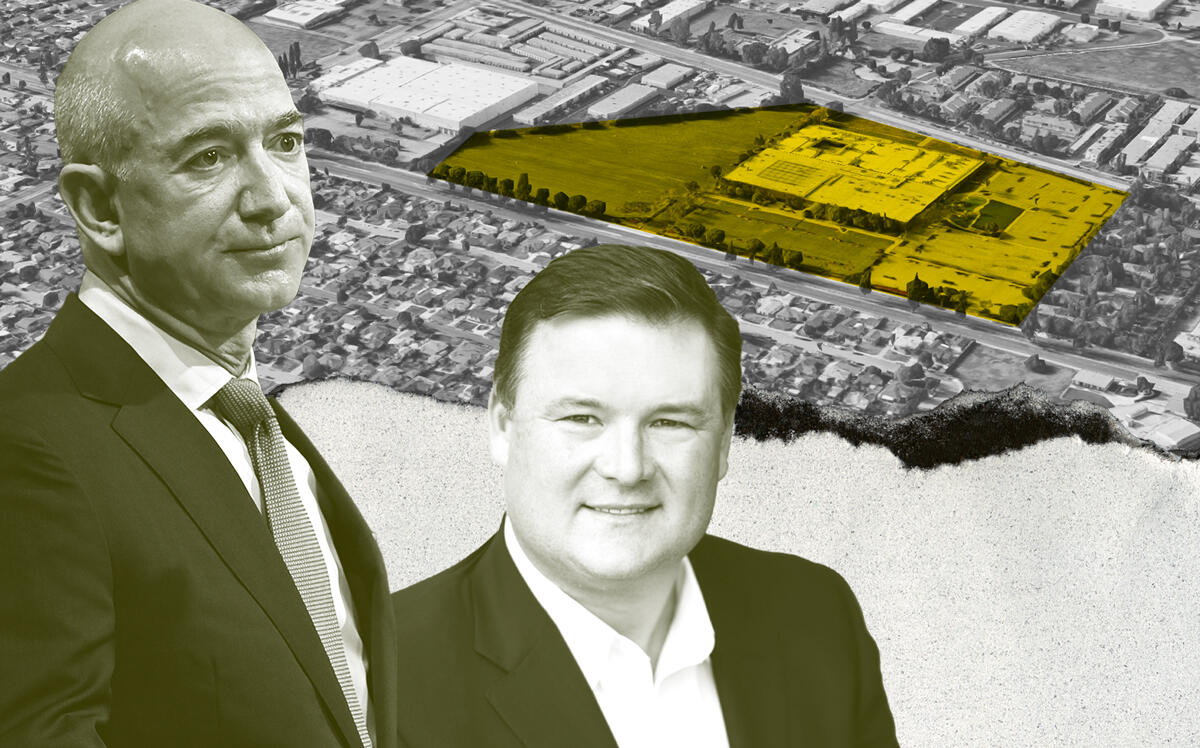The modest suburban San Gabriel Valley town of West Covina was set to get an Amazon warehouse–a redevelopment plan for a 177,500-square-foot property that had most recently been used as a church.
The company signed a 12-year lease with developer Greenlaw Partners, who recently bought the site for $58.45 million.
Amazon even named the planned warehouse at 1211 East Badillo Street — “DAX9” — signifying its status as part of its ever-growing network of warehouses.
Then came a backlash from environmental groups and local labor unions.
After planning the project with Greenlaw Partners for more than two years, Amazon pulled out of its lease earlier this month. The decision came after two local Teamsters unions and nonprofit The People’s Collective for Environmental Justice settled a lawsuit with Greenlaw Partners over environmental reviews for the warehouse.
Sources who are familiar with the project but not authorized to speak publicly on the matter told TRD that Amazon didn’t want to run the risk of any future union lawsuits or environmental challenges. Greenlaw has taken the heat in settling the initial legal challenge, sources said, but the e-commerce giant was spooked.
Amazon indicated it has kept its options open in the area.
“While we have decided not to pursue the site in West Covina, we continue to assess opportunities to invest and grow across the region,” an Amazon spokesperson told TRD.
Amazon “weighs a variety of factors when deciding where to develop future sites” and it is common for the company to “explore multiple locations simultaneously and adjust based on operational needs,” the spokesperson added.
Greenlaw Partners did not respond to a request for comment.
The union push
Amazon is up against unionization efforts at a number of its warehouses across the country, from Staten Island to Alabama, where workers recently voted against joining a retail, wholesale and department store union. That win for Amazon came after it conducted an aggressive campaign to quash the union drive, according to reports at the time.
Although Amazon faced no specific litigation around labor or unionization issues in West Covina — it wasn’t even named as a defendant in the environmental suit — it faced backlash from the local Teamsters chapters. The union wanted a tenant that would work with labor unions, sources said, although opposition to Greenlaw’s development presented a laundry list of other requests.
Teamsters Local 396 — one of the union locals that sued over the project — was “concerned with what impact the development would have on the community, in regards to pollution, vehicle traffic and job quality,”
Adan Alvarez, a spokesperson with Teamsters Local 396, told TRD. There also were “definitely some concerns” over safety and a lack of unionization, he added.
After the project was approved by the city council in October, the labor unions and nonprofits Peoples Collective for Environmental Justice and West Covina Alliance for Responsible Development filed a suit against Greenlaw, arguing the project did not include adequate environmental reviews and mitigation plans, according to court documents.
Earlier this month, the suit was settled, with Greenlaw agreeing to install solar panels, electric vehicle charging stations at the site and a commitment that it would strive to “attain” 100 percent renewable energy for the warehouse by 2025.
The terms of the settlement are fixed “regardless of the tenant,” Alvarez said. “It applies whether it’s Amazon, or FedEx, or UPS or DHL.”
An empty warehouse
Amazon’s decision to pull out leaves Greenlaw with approved plans for an Amazon last-mile delivery station, but no tenant. Greenlaw now has to find a tenant that would be willing to work within Amazon’s specific plans for the project.
The city approved to change the zoning for the site to M-1 — a limited industrial zone that permits manufacturing, processing and warehousing. A new project will have to fit this zoning — though some small changes could be made — or it will have to go back through city planning.
“This is a fully approved project and we’re working diligently to secure another similar tenant for this site,” West Covina Mayor Dario Castellanos said in a statement to TRD. “The development agreement has been signed by all parties and remains in effect.”
But any new tenant could have different needs. An Amazon warehouse, which requires specific clear heights, a certain number of dock doors and hundreds of parking spaces, might not be the right fit for another tenant.
Greenlaw may also have to adjust its financing for the project. The firm scored a $79 million construction loan from Walton Street Capital in connection with its acquisition of the West Covina site, records show. That was before Amazon pulled out of the deal.
Amazon’s decision to quit its lease is also a strain on its relationship with Greenlaw Partners. In October, the company sold a 290,000-square-foot Amazon distribution facility for $128 million. Greenlaw bought the former office property for $16 million, spent $17 million on renovations and then signed Amazon to a 15-year lease.
Amazon’s edit in West Covina might speak volumes about its relations with organized labor but it’s a blip in the trend of dramatic growth of its real estate portfolio, including last-mile distribution hubs — where items are stored before direct distribution to consumers — across the country. In 2021, Amazon doubled its own real estate holdings and added around 30 percent more leased space. It currently operates around 387 million square feet of warehouse, distribution and data center space across North America.
